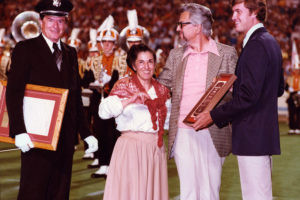“Rocky Top,” the rollicking tune synonymous with the University of Tennessee, wasn’t always a campus staple. While it now feels deeply ingrained in the Volunteer spirit, this iconic song only officially debuted at UT in 1972. Celebrating its 50th anniversary that year, “Rocky Top” has become more than just a song; it’s an enduring nickname for the university itself, and a tune that opposing teams and fans alike might grudgingly acknowledge, if not outright call infamous.
The genesis of “Rocky Top” traces back to 1967 in Gatlinburg, Tennessee, at the Gatlinburg Inn. Husband-and-wife songwriting duo Felice and Boudleaux Bryant, East Tennessee natives, were crafting songs for country music luminaries Archie Campbell and Chet Atkins. Amidst working on slower, more deliberate pieces, “Rocky Top” emerged as a spontaneous and energetic diversion. Legend has it that this future Tennessee anthem took a mere ten minutes to write, yet it blossomed into one of the state’s most recognized and celebrated songs.
The same year of its creation, Kentucky-based bluegrass pioneers, The Osborne Brothers, recorded “Rocky Top.” The song resonated instantly, climbing to number 33 on the country music charts and demonstrating its broad appeal beyond its Appalachian roots. Further solidifying its crossover potential, Lynn Anderson’s rendition of “Rocky Top” in 1970 ascended even higher, reaching number 17 on the Billboard Country Top 100. These early successes hinted at the song’s lasting power and its ability to transcend genres and regional boundaries.
 Felice and Boudleaux Bryant Honored at UT Football Game
Felice and Boudleaux Bryant Honored at UT Football Game
It was UT Band Director W J Julian who recognized the potential of “Rocky Top” to ignite school spirit. He decided to introduce the song to the Pride of the Southland Band’s repertoire for the halftime show of the October 21, 1972, football game against Alabama. While the Volunteers didn’t secure a victory that day, “Rocky Top” scored a resounding win with the crowd. It was immediately embraced and rapidly became a beloved fixture at University of Tennessee athletic events, its lively melody and spirited lyrics perfectly encapsulating the fervent energy of Vol Nation.
Two years later, in 1974, the pep band infused “Rocky Top” with an even more energetic and jazzed-up arrangement for the Conference Coaches Association tournament. This evolved version is the infectious rendition that continues to electrify crowds today. The official recognition of “Rocky Top” arrived in 1982 when it was formally adopted as one of Tennessee’s state songs, cementing its cultural significance beyond the university and across the entire state.
“Rocky Top’s” appeal has only amplified over time. Its presence extends far beyond the University of Tennessee campus. Throughout East Tennessee, and increasingly across the nation, “Rocky Top” is a ubiquitous sound. It’s a staple at weddings, parties, and concerts, demonstrating its versatility and enduring popularity in diverse settings. Iconic performances, such as Dolly Parton’s rendition at the 2009 UT commencement ceremony where she received an honorary doctorate, and Garth Brooks’ stadium-filling performance of the anthem in Neyland Stadium in 2019, further illustrate its widespread cultural impact.
Although not officially designated as the university’s fight song, “Rocky Top” has garnered widespread acclaim as one of the most spirited and recognizable anthems in college sports. Prestigious publications like NFL.com and Sports Illustrated have consistently ranked it among the top college fight songs, solidifying its place in the pantheon of collegiate musical traditions.
From its humble beginnings in a Gatlinburg hotel to its current status as a state song and national college sports anthem, “Rocky Top,” with its perhaps controversial but undeniably catchy “woo” that emerged organically over time, remains one of the University of Tennessee’s most cherished and contagiously spirited traditions.

